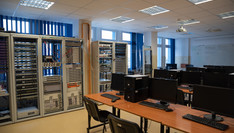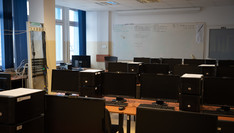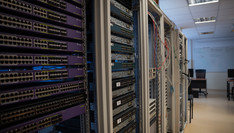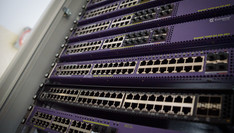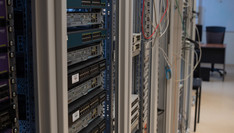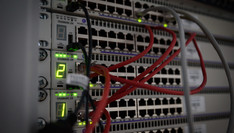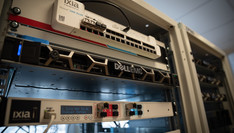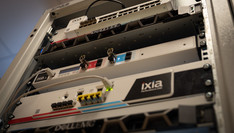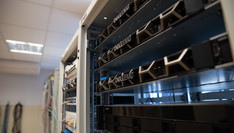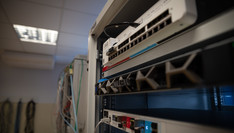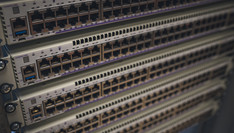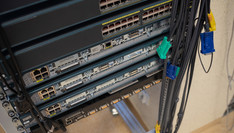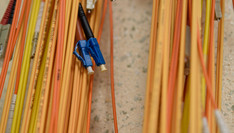Science and research and teaching laboratory. Research conducted in the laboratory of computer networks, converged systems and complex ICT systems concern a wide range of issues in the field of design and operation of complex communication systems, including effective and trouble-free data transmission in the environment of ICT networks. The laboratory conducts research in the area of: network traffic analysis, its properties and impact on network infrastructure; analysis of long-term processes occurring in computer networks; research on mechanisms of load balancing and maintaining the reliability of network infrastructure, as well as ensuring the resistance to damage of network structures carrying out data transmission in critical infrastructures; automating the process of managing distributed systems, optimizing the use of elements of the transmission system (eg tolerance of damage, load balancing). The laboratory also performs tasks in the design and configuration of network infrastructure based on both a homogeneous and heterogeneous environment of computer networks. As part of the work, various configuration scenarios are tested based on widely accepted standards and network protocols as well as proprietary and newly created mechanisms and network solutions. The scope of work and exercises relates both to issues related to Enterpise class networks, operator networks, as well as industrial ones used, among others in Industry 4.0 and energy. Laboratory equipment also allows you to test ready-made solutions before implementing them for production or operation in the proof of concept scenario. Most of the laboratory equipment is also used by students during classes, during the preparation of diploma theses and during student internships.
In addition to the network equipment of the leading manufacturers, there are software and hardware traffic generators, motion analyzers and simulation platforms (eg Riverbed Modeler, Omnet). Researchers and students have also prepared computer stations, structural cabling (copper and fiber), auxiliary servers and private cloud resources. The wide range of available equipment also allows work to be carried out in cooperation and for industry.
Selected issues implemented in the laboratory:
- research in the field of design, construction and operation of modern distributed data communication systems, in particular computer networks;
- development and testing of new data transmission mechanisms;
- synthesis and analysis of network topologies for large-scale connection systems;
- research into computer networks in the context of the features of complex systems such as: self-similarness, self-organization, self-adaptation, emergence, power law, networks of any scale, non-addiction, etc .;
- performance tests of devices and network mechanisms of critical infrastructure;
- development of mechanisms for controlling and controlling flows in a converged network environment;
tests of reliability and resistance to damage of critical elements for distributed systems, including computer networks; - development of algorithms in the field of damage tolerance, load balancing;
- tests and tests in the field of automation of management of heterogeneous resources in distributed systems, including systems used in industry;
- development of expert opinions and implementation of PoC tests;
- detection of anomalies in distributed systems;
- research on the interoperability of IT elements in the industry 4.0 environment .
The laboratory is used to implement the didactics process from the modules "Computer Networks I and II", "Designing Systems and Computer Networks", "Designing and Operating Computer Networks I and II", "Network Traffic Management", "Converged Systems", "Systems Management and computer networks "," Computer Aided Designing of ICT Systems "," Design, Problem Workshop ", certified CCNA courses, student internships, diploma theses.
More important elements of equipment.
- 15 computer stations:
- OS: Windows 10,
- CPU: AMD Ryzen 5 3400G with Radeon Vega Graphics 3/70 GHz
- RAM memory : 32GB,
- Graphic card: Radeon RX Vega 11,
- HDD/SSD: 1 TB
- network devices, including network switches:
- OmniSwitch OS6350-P24 - 2 pieces,
- OmniSwitch 6850 - P48x- 15 items,
- OmniSwitch 6850E - P24x- 1 item,
- OmniSwitch 6850E - P24- 1 item,
- OmniSwitch 6860E - P24 - 2 pieces,
- OmniSwitch 6860E - 24 - 8 items,
- OmniSwitch 6900-T20 - 2 pieces,
- OmniSwitch 6860N-P48Z – 9 items,
- OmniSwitch 6900-V48C8 – 1 items,
- OmniSwitch 6900-T48C6 – 3 items,
- OmniSwitch 6900-X72 – 2 items,
- Cisco Catalyst 2960 - 5 items,
- Cisco Catalyst 3560 x6 PoE-24 - 4 items,
- Cisco Catalyst 3650 24 PoE + 4x1G - 5 pieces,
- Extreme networks Summit X460-G2-24t-GE4 - 9 items,
- Extreme networks Summit X460-G2-48p-GE4 - 1 item,
- Extreme networks SSA-T8028-0652 - 1 piece,
- routers and firewalls:
- OmniSwitch 9600 - 1 item,
- OmniSwitch 9700E - 2 pcs,
- Cisco 2800 - 6 items,
- Cisco 2901 - 9 items,
- Cisco ASA 5505 - 6 items,
- Access Point:
- Extreme networks WS-AP3825i - 8 items,
- Cisco Linksys E1200 - 2 pcs,
- Linksys EA2700 - 3 pieces,
- servers:
- Extreme networks PV-A-300,
- Shuttle XPC,
- 2 servers with NetFPGA network adapters,
- network infrastructure tester IXIA Novus ONE PLUS,
- IXIA Network Emulator II network emulator,
- hardware traffic generator:
- JDSU TS-170 - 1 item,
- IXIA PerfectStorm ONE - 1 item,
- QNAP NAS data storage system,
- network cards 10/100 / 1GB,
- proprietary applications to support the process of designing computer networks,
- distributed systems for managing the ICT environment,
- specialized applications, including: Opnet Modeler, Omnet ++, multicast traffic generators, open source traffic analysis tools - Ixchariot Ixia,
- Open source software (eg iperf, jperf, NS-3), SolarWinds,
- 15 computer stations equipped with Windows operating systems,
- copper structural wiring cat. 5, 6 and 7,
- fiber optic cabling: single-mode (LC and SC) and multimode (LC, SC and ST),
Laboratory address:
ul. Marii Skłodowskiej-Curie 8/2
building F, room F602




